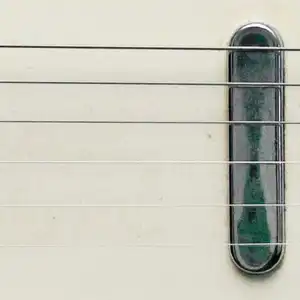Best Guitar Strings For Sweaty Hands


If you’ve been playing guitar for a while, you’re well acquainted with the struggle of sweaty hands and corroded strings. You go on stage, play a great show, pack your guitar up, and then your strings are corroded by the morning. It is an endlessly frustrating issue that can leave your fingers sore and your wallet empty.
So how do you beat the sweat? Why does it even corrode your strings? Is there anything you can do to prevent it? Are there strings that can stand up to more sweat? Keep reading and we will answer all of these questions, finally getting to the bottom of the sweaty hand and corroded string conundrum.
Why Does Sweat Corrode Strings?
It’s no secret that guitar players can get sweaty, especially while on-stage under the bright lights. But what’s in our sweat that causes it to corrode strings? First off, sweat contains minerals like sodium, calcium, magnesium, and potassium, all of which can result in string corrosion.
Many of us also have acidic sweat, which causes the strings to corrode even more quickly. However, that acidity varies from person to person. That is why some people seem to have no issue with their strings corroding, while others have to change their strings twice a week to keep them fresh.
That said, everyone’s sweat does contribute to string corrosion to varying degrees. It just depends on your habits and body chemistry as to how quickly your sweat will corrode your strings. Now, let’s move on to potential solutions.
What Can You Do to Prevent It?
Thankfully, there are a multitude of ways to prevent and slow string corrosion from sweaty hands. Some of these solutions are more difficult to implement than others, but they will all help you lengthen the life of your strings and save some money (and stress).

Hygiene
The easiest and most obvious way to prevent string corrosion is by following good guitar hygiene. Keeping your hands and strings as clean as possible at all times is one of the best ways to avoid corrosion.
The two main habits you will want to form are washing your hands before you play and wiping your strings down when you are done playing. Both of these will keep your hands and strings as clean as possible. Washing your hands will remove all the sweat, gunk, and debris that has built up on your fingers, and wiping down your strings will prevent all of that sweat and gunk from sitting on your strings.
Be sure that you are disciplined about it. Don’t play your guitar without washing your hands, wipe your strings down between songs, and always wipe your strings off with a microfiber cloth when you are down. This will prevent build-up in the coils of your strings and extend their lifespan considerably.
Products for Your Fingers/Hands
Another option is to use products on your fingers and hands. Jeff Beck famously used powder to deal with string corrosion. Talcum powder used to be the go-to, but due to research showing links between talcum powder and cancer, it’s best to avoid it. Instead, many players use cornstarch which is cheap and readily available.
There are also lotions/creams that are supposed to balance the pH on your hands and add a barrier between your fingers and the strings. For example, Guitar Hands was created by a dermatologist and aims to clean your hands, balance the pH, and reduce string/neck friction.
It is worth noting that these solutions are not without their downsides. Products like talcum powder and even lotion can result in more gunk being built-up on your strings and fretboard, which means more time spent cleaning your guitar. Many also report that these products can become sticky after a few hours of use.
Regardless, using products on your fingers and hands are a solid way to extend the life of your strings and prevent corrosion. It ultimately depends on your personal preferences as to which method(s) are best for you.
Diet
Surprisingly, changing your diet can actually be one of the most effective ways to prevent string corrosion from acidic sweat. The foods and drinks we consume have a big impact on the makeup of our sweat. Certain foods and drinks that are highly acidic, such as processed meats and coffee, result in more acidic sweat, which in turn corrodes your strings quicker. Speaking with a dietician and eating a less acidic diet can help you extend the life of your strings.
However, acidic sweat can also be a symptom of other medical issues as well. If your sweat is highly acidic, speak to a medical professional and follow their advice. Addressing that issue and lowering the acidity of your sweat will do wonders for the lifespan of your strings.
And as many of us know from personal experience, changing your diet is easier said than done. It can be a big undertaking to eliminate foods and drinks from your diet. Though it is the best way to keep your strings from corroding, it is arguably the most difficult. Thankfully, the other options listed above and below are easier than changing your diet.

Best Guitar Strings For Sweaty Hands
Lastly, let’s take a look at the role strings play and which are the best for sweaty hands. The right set of strings can do a lot in terms of preventing string corrosion.
Acoustic Guitar Strings for Sweaty Hands
Coated strings are a great choice if you want your strings to last longer. Coated strings, such as our Foxwoods for acoustic, have an enamel coating that protects the strings from oils, sweat, gunk, and more. They prevent those materials from getting into the wire wrapping and causing corrosion.
Electric Guitar Strings for Sweaty Hands
For electric guitars, pure nickel strings like our Broadways are a solid option. Pure nickel strings are more durable and wear more consistently than nickel-plated steel strings. Besides being great for preventing corrosion, they have a very full and rich tone and are very flexible. If you haven’t tried a set of pure nickel strings, it’s worthwhile to pick up a set and try them out.
Conclusion
Though sweaty hands and corroded strings are a constant bane of guitar players, they don’t have to be if you take the proper precautions. While your strings will eventually corrode given enough time and wear, you can extend their lifetime.
Practicing consistent guitar hygiene, using products like talcum powder or Guitar Hands can protect your strings while playing, and changing your diet to lower the acidity of your sweat can all greatly extend the life of your strings and prevent corrosion. Choosing the right set of strings, like coated or pure nickel strings, will prevent needing to change your strings multiple times a week. With this knowledge in hand, the days of quickly corroding strings can be a thing of the past.
Other Posts you may like

Guitar Strings Order: How the Guitar is Tuned and Why

Best Acoustic Guitar Strings for Beginners

Two Handed Tapping: Our Top 8 Tappers of All Time

Which Guitar Strings Wear Your Fret Wire Down More?

What is Nashville Tuning? Its History, Best Guitar Strings & Uses

Guitar Scale Length Explained: String Tension & Playability
0 Responses
Leave a Reply
Your email address will not be published. Required fields are marked *




